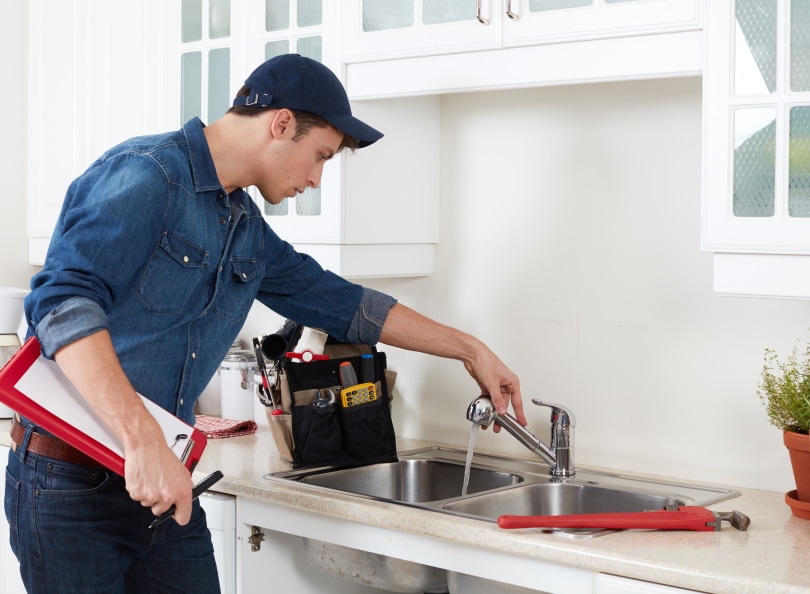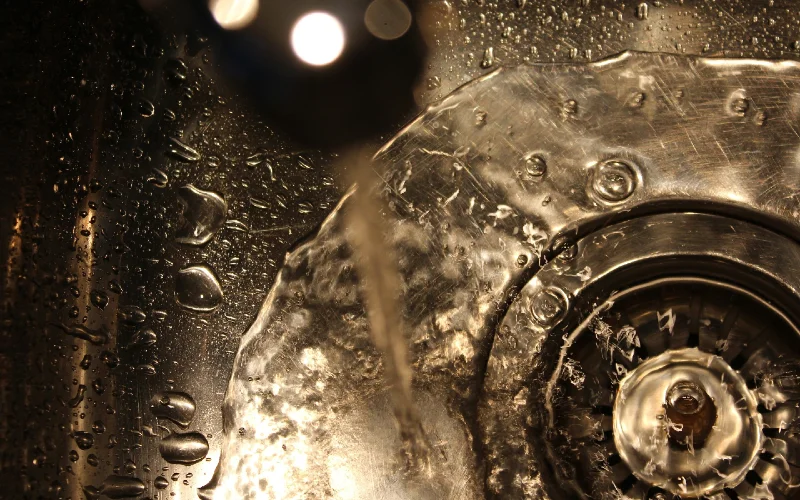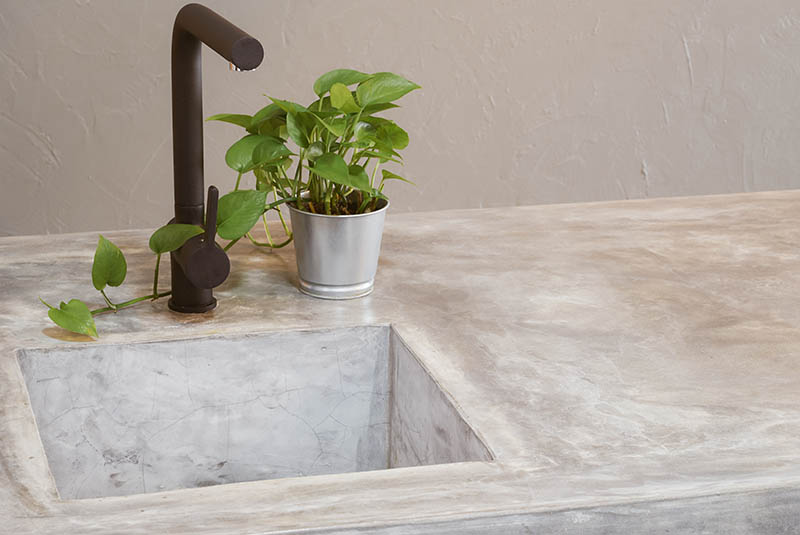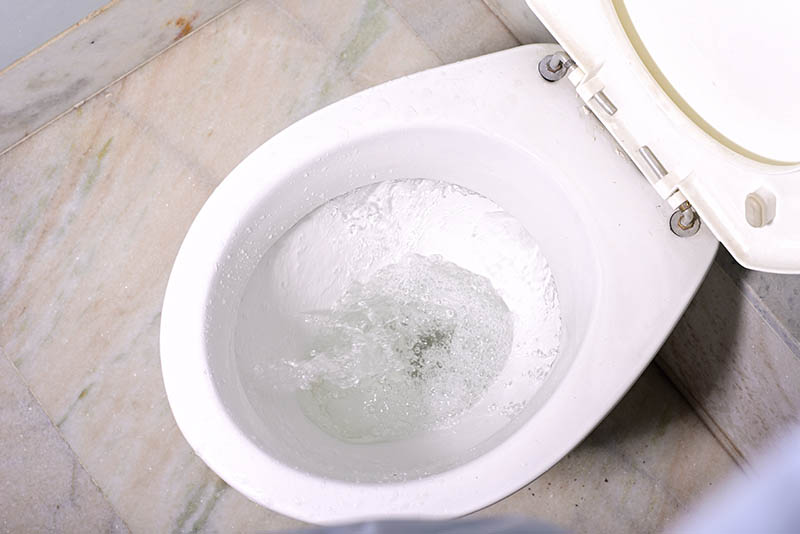12 Plumbing Myths and Misconceptions To Stop Believing Now
-
Pete Ortiz
- Last updated:

There are a lot of myths, misconceptions, and outright false information spread about plumbing. While some myths are harmless, others can cost you hundreds if not thousands of dollars over your lifetime.
In this article, we are going to learn about 12 plumbing myths and misconceptions. You might even be shocked by a myth or two. So, scroll down to learn more!
The 12 Plumbing Myths and Misconceptions
1. You can clean garbage disposal with lemons.
| Truth: | Lemons can damage garbage disposals |
| What to do Instead: | Clean with water, soap, and a gentle brush |
Many individuals believe that throwing a lemon down the garbage disposal will help to remove any stink and naturally clean off the blades. Even though the lemon will likely eliminate some stink in the short term, lemons are not a good way to clean out your garbage disposal.
Lemons do not have the ability to actually clean the disposal thoroughly, and they will dull and break your blades over time. Because of the damage that can be done from a lemon, you should never put lemons down a garbage disposal.
Instead, the best way to clean out your garbage disposal is to disconnect the power source. Then, use warm water, gentle dish soap, and a brush to scrub all the scum away gently.
2. Anything can go down garbage disposals.

| Truth: | Many items can break the blades |
| What to do Instead: | Only put soft food down a garbage disposal |
One of the most common misconceptions about garbage disposals is that they are tough enough to handle anything. This is simply not the case. Because the blades are not made from titanium, they will get dulled and broken if exposed to hard objects, even if the water is running.
You only want to put soft foods down the garbage disposal. Avoid harder foods, like bones, eggshells, and even grease. The best way to care for the garbage disposal is to toss most of the food in the trash can and only use the garbage disposal when the extra bits stuck to the plate are removed.
3. Ice cubes will sharpen garbage disposal blades.
| Truth: | Ice cubes will dull the blades |
| What to do Instead: | Don’t try to sharpen garbage disposal blades |
As of late, there have been a lot of social media videos claiming ice cubes can sharpen garbage disposal blades. This is not the case. Ice cubes will not sharpen any of the blades, mainly because the blades in the garbage disposal work as impellers, not slicers.
Because the blades impel the food, the ice is not actually going to sharpen the blades. Not to mention, the ice itself can dull the blades since ice is tough. Just don’t sharpen garbage disposal blades because they don’t need it.
4. It’s normal for a faucet to leak.

| Truth: | Leaks mean there is a problem |
| What to do Instead: | Fix the leak and save money |
Especially in old homes, homeowners often believe that leaks are completely normal from their faucet. Although it is true that it is normal for a faucet to leak over time, it is important to rectify the leak immediately.
If you do not take the time to fix a leaky faucet, you could end up paying a lot of extra money or allowing a bigger problem to go unnoticed. A leaky faucet might mean that there’s a problem with your water pressure.
As soon as you notice a faucet is leaking, examine it to determine why. It might be as easy as fixing the seal, but there may be more serious problems that need to be resolved.
5. Turning handles tightly should stop faucets from leaking.
| Truth: | Turning the handle too tightly can damage it |
| What to do Instead: | Fix the leak properly |
Obviously, failing to turn off a handle will cause the water to continue flowing. Because of this fact, many homeowners think that shutting a handle tightly will cause the faucet to stop leaking. If the faucet is leaking, this will not fix the problem, and it will often lead to other problems.
If you continually close faucet handles too tightly, you can break the faucet or the pipes. Only close the handle until the water stops flowing. If it continues to leak, you need to fix the leak accordingly.
6. It’s normal for water pressure to fluctuate.

| Truth: | Water pressure should be relatively stable |
| What to do Instead: | Hire a plumber if there are problems with water pressure |
Water pressure is supposed to be stable. In the case that your water pressure fluctuates, there is likely a problem with the pipes. Because pipes can be difficult to examine, you will always want to hire a professional to do this job for you.
7. You need harsh chemicals to clear clogs.
| Truth: | Harsh chemicals can damage pipes |
| What to do Instead: | Unclog the pipe yourself or call a plumber |
Sometimes, it can be tempting to grab the harshest chemical if you have a tough clog you can’t get rid of. Even though the chemical may remove the clog, it is likely to damage your pipes in the process. Especially if you have old pipes, harsh chemicals can cause them to be corroded, which will cause a lot of damage down the line.
If you have a clog that needs to be removed, it’s better to do it manually. If you have experience unclogging a pipe, you can do it yourself, or you can hire a professional plumber to do it for you.
8. You can unclog a sink using a plunger.

| Truth: | This can work in some cases but not all |
| What to do Instead: | Unclog sinks manually |
Technically speaking, it is possible to unclog a sink using a plunger, but it won’t work in every case. More so, it is imperative not to use this method if you have put any type of chemical down the drain since the plunger can cause you to burn yourself if the chemical comes out.
If you have a clog that needs to be removed, manually do it yourself. You can unclog a drain on your own, or you can call a plumbing professional.
9. Toilets flush the opposite direction in Australia.
| Truth: | Direction is determined by jets |
| What to do Instead: | Nothing |
In nature, there is something called the Coriolis Effect. This effect explains that the cyclone’s rotation is determined by the hemisphere. Cyclones in the northern hemisphere rotate in the opposite direction of cyclones from the southern hemisphere.
Many individuals apply this effect to toilet bowls as well, assuming that toilets flush in the opposite direction in Australia than it does in America.
As cool as this might sound, the Coriolis Effect does not impact toilet direction. Instead, a toilet will drain in the direction that its jets are pointing. Even if the jets were not responsible for the direction, there is simply not enough water in the toilet bowl for the Coriolis Effect to take place.
10. It’s okay to flush anything that claims to be flushable.

| Truth: | Many “flushable” items are harmful to your pipe system |
| What to do Instead: | Only flush toilet paper |
There are tons of products on the market that claim to be flushable. Sanitary wipes, feminine products, and paper towels, for example, are often advertised as being flushable, but they can do a lot of damage to your pipe and sewage system.
No matter what the package says, only flush toilet paper and your human waste. Anything else can and will clog your pipes, even if it takes years for the clog to accumulate.
11. A noisy water heater needs to be replaced.
| Truth: | The noise may just mean the heater needs to be cleaned |
| What to do Instead: | Hire a plumber |
Water heaters are not supposed to be excessively noisy but don’t automatically panic if your water heater is getting a bit loud. Often, hot water heaters get noisy whenever there is a sediment build-up inside. Cleaning out the sediment will fix the problem.
What happens is that hard water causes minerals to build up at the bottom of the tank. Whenever the heater turns on, the sediment expands and results in air bubbles, which are causing the racket from your hot water heater.
You can technically clean the sediment out of a water heater yourself, but it’s always best to get this job done by a professional. This will save you a lot of money because it will extend the lifespan of your hot water heater without requiring you to buy a new one outright.
12. Any plumber will do.

| Truth: | Not all plumbers are created equally |
| What to do Instead: | Do your research to get the best plumber in your area |
If you are not experienced in plumbing or other manual industries, it might be difficult to know whether or not a plumber is experienced. Even though that might be the case, it’s imperative to realize that not all plumbers are created equally.
On the contrary, some plumbers do subpar or shoddy work, whereas others use top-notch technologies and techniques to properly fix and improve your home.
When you need to get in contact with a plumber, do your research to make sure that they are reputable and well experienced. Read reviews or get referrals from close friends and family members directly.
When Should I Call a Plumber?
Anytime you are having problems with your sinks, drains, and plumbing, there is likely a problem at hand. If you have experience with plumbing yourself, you can do a quick evaluation to determine what the problem is. Depending on what you find, you might need to call a plumber.
In the case that you have no experience with plumbing, call the plumber right away. Even if the problem is minor, calling a plumber can save you a lot of money by rectifying the issue before it escalates.
Conclusion
As you can see, there are a lot of misconceptions and myths about plumbing. If you are ever confused or unsure of the plumbing situation in your home, it’s always best to contact a professional. A professional will set the record straight so that you can have the safest and most cost-efficient home possible.
Featured Image Credit: stevepb, Pixabay
Contents


